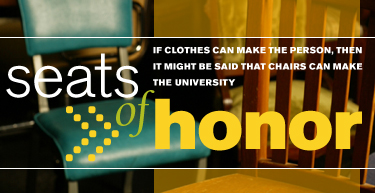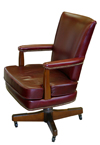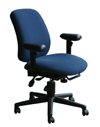Seats of Honor
We're not talking wood versus plastic, but rather, the number and quality of endowed chairs at an institution of higher education. Although not a familiar term to most outside of academia, to academics "endowed chair" connotes respect and recognition. For Baylor, aspiring to become a top-tier institution while maintaining its Christian heritage, endowed chairs are necessary to garner the national attention and collegial respect inherent in educational excellence.
With 53 endowed chairs, and two new ones established this year, Baylor is well-suited for its aspirations.
Baylor's first endowed chair, the Robert A. Welch Distinguished Chair in Chemistry, was established 40 years ago by the Welch Foundation. The most recent ones, unusual in that they are for a husband and wife at Baylor, are the David E. Garland Chair in Preaching and the Diana R. Garland Chair in Child and Family Services, separate gifts that were announced in April. Although the Hankamer School of Business has the most endowed chairs of any school at Baylor with 14, they exist across academic departments.
"A person who supports endowed chairs often has a very good understanding of the broad academic picture of the university," says Cindy Dougherty, BA '74, MSE '82, assistant vice president for academic, foundation and corporate development and the Baylor Fund. "If you're able to bring in a faculty member who, over the course of 20 years, teaches students and mentors them through research and one-on-one kinds of interaction, that has a huge impact on many students."
Endowing a chair requires a $2 million donation -- one of the largest categories of gifts on Baylor's campus. The gift often is funded in installments or through planned gifts such as estates and trusts. The chair is announced when the agreement between the University and the donor is complete, even though the position may not be fully funded yet.
"In general, giving to the University in any sense is important because it helps us finance our dreams, goals and objectives," says Randall O'Brien, Baylor interim provost and vice president for academic affairs. "This year we had requests for 150 faculty hires, but we were only able to grant 41 of those requests. So, if someone were to endow a chair, that would allow us to hire one more professor. It would allow us to bring in a distinguished professor or perhaps a professor who's been at Baylor for 10 or 20 years to occupy that chair and free up those funds for us to make another hire."
Endowed chairs require a three-way partnership among the administration, academic departments and benefactors. Donors interested in endowing a chair first meet with Baylor's Development staff to discuss their goals for the gift. Often, benefactors talk with professors from the academic department in which they will be endowing a chair. Information about the donor's motivations and intentions for the chair is included in the final agreement with the University.
"For years to come, since this is in perpetuity, the holders of the endowed position will understand who the donors were and what motivated them," says Dougherty, who often meets with endowment donors.
Endowed chairholders, often high-profile teachers and scholars in their fields, are chosen through a collaborative process involving the academic department where the chair is housed and Baylor's provost and president.
Provost O'Brien says that chairholders are likely to be professors who are excellent teachers and accomplished researchers -- exemplars for the University. "At Baylor, we want to engage in the discovery of new knowledge," he says. "An outstanding professor is likely to be one who is not making a choice in her career between teaching and research, but one who engages in research in order to enhance her teaching and also to add to the corpus of new knowledge in her field."
Professors may hold the positions for three-year terms, at the end of which they may be reviewed. Usually, appointees report to the donor of their chair on an annual basis. They also submit yearly performance appraisals to the deans of their respective schools, a review procedure that applies to all faculty.
Chairholders benefit from the prestige that the position offers and are afforded release time from teaching to pursue the research with which they enhance their classes. Students benefit from these enriched courses and from participating in research projects. Chairholders may have more time to mentor individually because of reduced teaching loads. "Our faculty members really care enough to do that. It inspires the students to see greatness in themselves," Dougherty says.
Baylor also has 43 endowed professorships, which require a $1.5 million gift; 37 endowed lectureships, which range in funding level depending upon the frequency and components of the event; and more than 2,100 named endowed scholarships for students, which can be established with a $25,000 gift.
"I think about those faculty members who impacted my life and some of those were holders of endowed chairs," Dougherty says. "Without those funds to bring people like that to the University, we might not have had them. They make life-changing experiences for our students."
Baylor's three most recently named chairholders represent different academic fields and a world of interests. Read on for their profiles.



